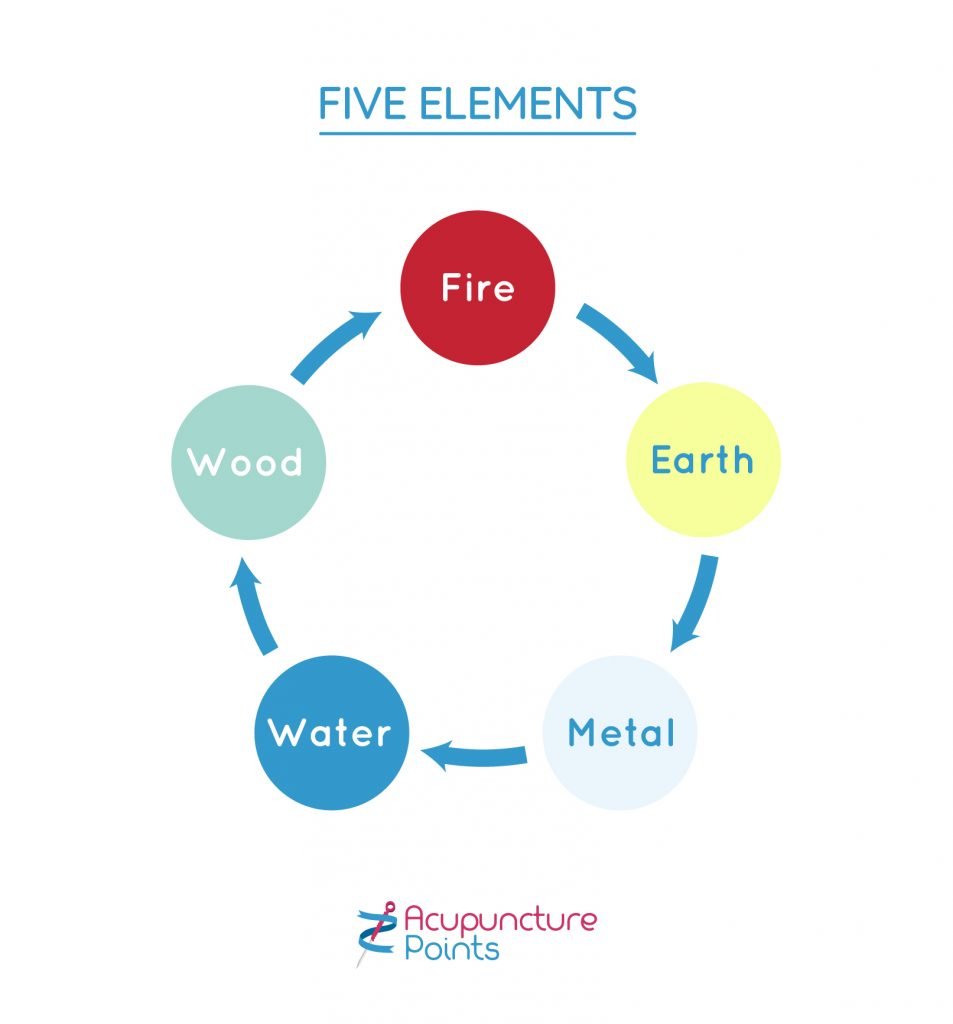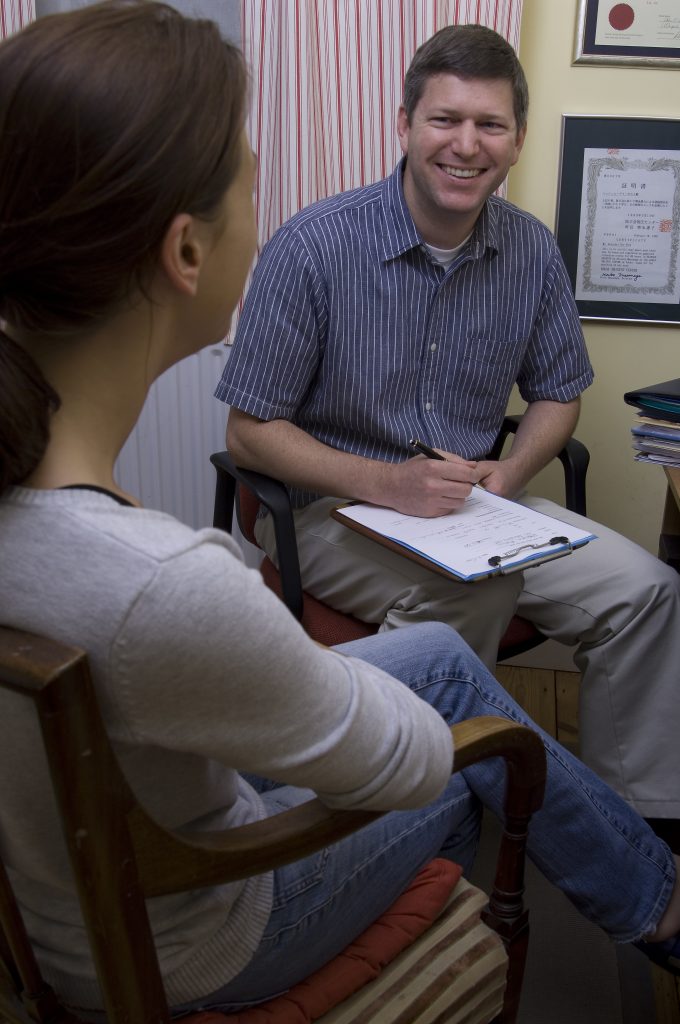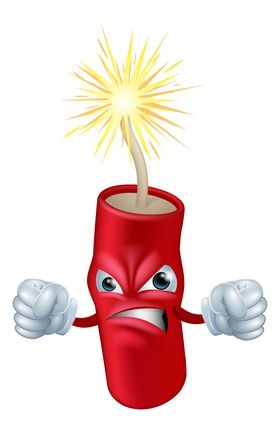Subscribe to the Newsletter
If you are interested in understanding how Traditional Chinese Medicine can improve your life sign up to my newsletter for the latest updates.

However, people in China get depressed too, so of course they use acupuncture! But how they diagnose it is very different from the Western orthodox medicine diagnosis.
Fundamentally, the Chinese medical theory says something like this. Anyone in pain, mental or physical, is experiencing a blockage in their flow of ‘Qi’ (- pronounced TCHEE!).
Let’s call this ‘Qi’ ‘life energy’, although ‘life energy’ is not a very good definition of Qi. Click here to read more about Qi.
Qi takes many forms: it includes the sparkle in your eyes (Shen qi), the blood in your arteries (Blood qi) the energy your stomach possesses to digest food, or not … (Stomach qi) and so on.

Take a small river. Imagine the flow of water as being like the flow of Qi. Water occupies the space available: though it runs smoothly and quietly it has momentum and force – you can be carried along by it.
This is health: you feel well, everything is running smoothly, and your life has purpose, energy and direction.
When it floods, it is potentially dangerous (excess of yang or yin).
In drought, when water is scarce, we get thirsty and fish die (deficiency of Blood and/ or Yin), and its force won’t turn the water-wheels.

When a bridge collapses into a river, or the banks slide down into it, there forms an obstacle to the flow which behaves like a dam: pressure builds up on one side (excess), with scarcity on the other (deficiency).
As water forces its way through or round the dam, the quiet is broken, things get broken, and the force of the river is reduced (qi stagnation).
Similarly with acupuncture for depression. Using concepts like ‘yin’, ‘yang’, (read more about yin and yang here) ‘qi’, ‘blood‘, ‘excess’ and ‘deficiency‘ many conditions can be diagnosed.
Many other concepts are used too, such as how strongly qi flows along the acupuncture meridians; where is there excess or deficiency in the body’s powerhouse – its internal organs like the Heart, Kidneys, Liver, Stomach, Spleen, Bowels; – and so on. (If you click on the links you’ll find that the ideas in Chinese medicine about what these ‘organs’ do is rather different to that in Western medicine.)

More than that, the very ancient system of the Five Phases or Five ‘Elements’ is used to gauge how someone might first have become depressed, ie the main energy disturbance underlying their depression. This often provides a relationship between the individual and their universe.
Usually more than one syndrome occurs at a time. But let’s start with a simple one that is common and doesn’t usually last long. Most people get better from it on their own, although acupuncture for depression of this kind would certainly speed the process.
Here’s how you feel:
In fact people notice your eyes running and ask what’s wrong and why you’re sad – though you probably don’t feel sad at all.
You may find your saliva dribbling in your sleep. You sweat easily on even slight exertion.
Well you don’t have it in you. Even less so, going uphill!
You see your doctor.
Technically, you don’t have melancholic depression: you don’t tick enough of the boxes for it, but he can see that you’re definitely ‘down’, and he wonders to himself if you might get worse.
He checks your blood pressure, listens to your breathing, perhaps takes a blood sample to check for anaemia, asks questions about how long you’ve had it, and so on.
If it started after an illness, he might say you just need to rest more and you’ll recover, sooner or later, unless the illness or old age have greatly weakened you. (And he’s absolutely right, from the point of view of Chinese medicine!)

He doesn’t really want to prescribe anything for you, except perhaps a vitamin pill, if he’s interested in nutrition.
But life being what it is, you’ll expect to receive something from him. He might suggest you see a cognitive therapist, or perhaps he’ll offer Prozac, one of the SSRIs explained here.
Would Prozac work? Well, it might cheer you up, and that might help a bit. But it doesn’t have the power to increase your energy levels, which is where your problem lies.
In terms of Chinese medicine, you have a deficiency of qi, pure and simple: more specifically, a deficiency of Lung qi.
This is an old saying in Chinese medicine:
Your condition is that of a lack of qi. It’s common after many diseases, especially as you grow older, and particularly after lung diseases, colds, coughs, bronchitis, pneumonia and often after covid 19.
(Regarding the pandemic I’d say that anyone who is exhausted after the coronavirus covid 19 would benefit from acupuncture and Chinese medicine. Nearly all who had it badly will have Qi deficiency, which Chinese medicine recognises as a syndrome and knows how to treat!)
Rest plenty and if you’re young and in good health, you’ll soon recover. You probably don’t need acupuncture for depression of this type!
But if it takes an age, acupuncture for depression like this might help, and fast, because your condition has a very clear diagnosis and acupuncture for qi deficiency-type depression is usually very effective.
It’s just lowered energy, qi deficiency. You can get it in lots of ways, physically from a disease, mentally from some emotions.
With this Liver-Qi Stagnation form of ‘depression’:

This kind of ‘depression’ is also common. Most of us feel something like it after receiving bad news, or being unable to fulfil expectations, or when we’re in a hurry and all the traffic lights are against us.
But in these cases it’s usually transient: when the lights turn green the feeling subsides.
This is a classic case of what is called Liver Qi stagnation. If you’re a woman and suffer from pre-menstrual tension, you’ll recognize some of the symptoms, though you’ll have others too. But men can feel like this when events don’t turn out as they had wished.
Now – here’s a secret! It’s a secret because acupuncturists don’t really like to admit it. This Liver Qi stagnation condition is actually – usually – very easy to treat with acupuncture and acupuncturists have made fortunes out of it! Acupuncture for depression works really well here, and quickly.
Answer: when the cause of the condition can’t be removed.
If, say, your job is the problem, you’ll feel better and cope better after acupuncture for depression of this kind, but unless you can improve your job, your condition will return. So here, it’s not a cure.
But nor is any other therapy: what you must do is change your job, or the conditions of your job.
If you can’t do that and, let’s face it, that’s not always easy, acupuncture for depression of this kind will be palliative.
Still palliation is better than nothing, and since you aren’t on drugs you won’t get dizzy and you’ll still enjoy sex. (Active sex is usually good for this Liver-Qi Stagnation-kind of depression! Whereas … sorry! … it’s not usually good for the Lung Qi deficiency type. See more under sexual impotence.)

What then? Would acupuncture for depression work?
Of course it would, but your acupuncturist would want to find out which to treat first: what was the initial trigger, or what is your main way of reacting to life?
Knowing this he or she would be able to decide where to start.
For example, if your qi deficiency symptoms arose after bronchitis, and then later you got liver qi stagnation symptoms without any obvious cause for them, in designing acupuncture for depression of your kind he’d probably treat the Qi deficiency first because doing that might well cure the Liver qi stagnation. (Liver qi can stagnate when there isn’t enough qi, as when a river runs so slowly that its water smells foul and stagnates, and all the fishermen get cross because the fish die.)
If someone died, greatly upsetting you, leading to the Liver qi stagnation followed by the qi deficiency, an acupuncturist would probably treat the Liver qi stagnation first. Doing acupuncture for depression that way might stimulate your qi without needing specific treatment for it.
This order of treatment can be very important! Whereas, had he just treated the qi deficiency and ignored the Liver qi stagnation, it might not have worked, or given only temporary relief. Theoretically, it could even have made it worse.
Here are some other patterns in Chinese Medicine that can relate to different kinds of what Western medicine calls ‘Depression’. These can afflict you at the same time as other syndromes. For instance, you could have Liver Qi Stagnation together with Blood deficiency (which is actually very common.)
Without enough Yin or Blood, you can’t settle, or once settled, you can’t stay still for long.
This can be due to deficiency of Yin causing what is often called False Yang. Normal Yang Excess is a syndrome on its own, and its symptoms are closer to those of mania than of depression.
Still: I’ve known patients who to my eyes were manic but their doctor had diagnosed them as ‘depressed’.
What’s it like and where does it come from?
The usual reason for this is prolonged Liver Qi stagnation, ‘friction’ from which leads to Excess Liver Yang in the form of Heat.
If this is from hyperactive Liver Yang pushing upwards, then you’ll have excess above and deficiency below. Here you get a sense of fullness in the head, irritability, dizziness, headache and insomnia. Not so much ‘depression’ as ongoing tetchiness, impatience, haste. You are no fun to live with. Your tongue will be red.
Acupuncture for ‘depression’ of this kind usually works fast.

Prolonged Liver Yang excess can lead to Liver Fire – though not everyone goes through the Liver Yang stage first, especially children who can shift from Qi stagnation to Liver Fire in the blink of an eye.
Here you get tantrums, violent outbursts of fury and aggression, striking out at people; quite unreasonable behaviour; sometimes with headaches and pain in the sides.
It’s not uncommon to get other symptoms of Fire, such as a bitter taste and even a slightly burned smell on the skin.
Your tongue will be red and have a greasy yellow coating and your pulse will be strong and fast, and also probably it will feel ‘wiry’.
If there is both Yin deficiency and Yang excess, then severe anxiety comes into the picture, with a sense of agitation, sleeplessness and palpitations in your heart. You may sweat even when you aren’t hot, say at night or in the afternoon.
Even if you don’t sweat you’ll probably feel hot in various places like the soles of your feet, the centre of your chest and your palms.
Here your tongue is not just red, but cracked: it probably won’t have a coating but your tongue tip will be very red. Your pulse will be rapid, but it won’t feel strong when pressed. In fact, as you press it, it may feel as if the artery is empty.
If Spleen deficiency has led to Blood deficiency and Yin deficiency which lead to Yang excess, then there’ll be worry and obsessiveness. What is called damp-heat in the lower burner (the lower part of your abdomen) will mean very smelly stools, runny diarrhoea, and tiredness. Here your tongue will be swollen with a red tip and a yellowish coating.
Acupuncture for depression caused by Liver Fire works well.
(Click to read more about your Shen-Mind.)
This is another syndrome, Heart and Spleen Blood deficiency, sometimes useful when using acupuncture for depression. Although it often combines with some of the other syndromes mentioned, on its own it gives palpitations, dizziness, and anxiety. Memory is poor, and you are easily startled.
Falling asleep is a problem, but once asleep you probably stay asleep unless you also have one of the other syndromes.
The problem is low spirits and fatigue, and the inability to concentrate, to collect your thoughts: you are often confused or find your mind flitting between different subjects, never quite settling.
In addition, if your Heart qi is stagnant or deficient, you’ll be short of breath and made worse by exercise or exertion. If Heart Yin is deficient as well, symptoms will be more extreme, with impatience and aggression.
There are often many reasons for why your Shen is disturbed and acupuncture for depression of this kind, though it works well, may need additional advice or counselling, even nutritional advice.
When you have what is called Heart Fire, then agitation becomes extreme, serious insomnia comes with very disturbing dreams (if you can sleep at all), your heartbeat races, you are thirsty and impulsive; you may have ulcers in your mouth; you look red-faced.
This condition arises after years, or at least lengthy periods of time, of worry and anxiety. It can also arise from Liver Fire or Liver Yang Excess, ie from anger and resentment.
Acupuncture for depression of this Heart Fire type usually works fast, but needs to be repeated a number of times.
These often occur when you have Spleen qi deficiency, symptoms of which include poor digestion, diarrhoea, nausea and sometimes oedema. You feel distension in your upper abdomen and chest, and your tongue is pale and swollen with teeth marks along its sides. Tongue coating is usually greasy and white. For more on this see our page on Damp.
Arising from Spleen deficiency you can also get what is called Phlegm ‘misting the orifices of the heart’, leading to confusion, dull thinking, obsessiveness, over-thinking. With this syndrome, the patient mutters to himself.
Sometimes, with Phlegm Fire ‘Harassing the Heart’ it goes the other way and you get uncontrollable giggling, or crying out incoherently; always talking, shouting and sometimes violence.
Acupuncturists have been using acupuncture for depression connected with this syndrome (the Spleen) ie for fullness of this kind for over 2000 years. Together with advice (which means doing what you’re told!!) it can be very effective.
Well, if you’ve read all the way down to here, well done! I hope you found at least one pattern, or syndrome, that seemed familiar. As you read down the page, you encountered more and more syndromes. You can have more than one syndrome at a time, which means that working out the effective acupuncture treatment for depression can require skill.
I certainly suggest you get help. Don’t try to do it yourself!
Click here for more on orthodox treatment for depression.
Qi Stagnation is part of many kinds of Depression. I got so many questions about it that I started to increase the size of the page I have on it. Eventually I realised that the subject could be a whole website on its own, so I wrote a book about it. See column on right.

Stay in Touch!
No spam, only notifications about new articles and updates.

Book a Video consultation if you want to know more about your symptoms

Why You get Nervous Stomach Anxiety and How to Handle It. Acupuncture has great ways to help.
Subscribe to the Newsletter
If you are interested in understanding how Traditional Chinese Medicine can improve your life sign up to my newsletter for the latest updates.
Subscribe to the Newsletter
If you are interested in understanding how Traditional Chinese Medicine can improve your life sign up to my newsletter for the latest updates.